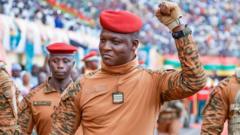Capt. Ibrahim Traoré's rise to fame as the country's youthful military ruler has sparked a wave of admiration from the African continent and beyond. His dynamic rhetoric and strong anti-Western sentiment resonate with those who feel marginalized by historic colonial legacies. With a focus on national sovereignty and economic independence, Traoré's administration is reimagining Burkina Faso's relationship with global powers, particularly as it navigates the complexities of alliances with Russia and other nations.
**Burkina Faso's Capt Ibrahim Traoré: A Revolutionary Leader Captivating Africa**

**Burkina Faso's Capt Ibrahim Traoré: A Revolutionary Leader Captivating Africa**
In a world increasingly skeptical of Western influence, Burkina Faso's military leader is carving his own image as a pan-Africanist hero.
The military leader's ambitious reforms and visionary policies have drawn comparisons to iconic African figures, cementing his status as a symbol of hope amidst disillusionment with traditional governance structures. But while his appeal skyrockets, the question remains: can he fulfill the promises made to an expectant populace and shape a prosperous future for Burkina Faso?
In the heart of West Africa, Capt. Ibrahim Traoré, Burkina Faso's 37-year-old military ruler, has emerged as a polarizing yet captivating figure following his rise to power in 2022. With a messaging strategy centered around pan-Africanism, he appeals to those weary of neo-colonial legacies, positioning himself as an advocate for national sovereignty in a region often influenced by Western powers. His critics, notably from France, view him as a pawn in a broader geopolitical game, where alliances with Russia hint at a shift in the continent’s dynamics.
Under Traoré's leadership, Burkina Faso is undergoing significant transformation. His government has implemented radical changes, seizing control of foreign-owned gold mines and introducing leftist economic reforms aimed at ensuring local benefits from the nation's mineral wealth. Furthermore, the junta's moves to build a state-owned mining company and establish national gold reserves signal a departure from previous policies that may have favored foreign interests.
Traoré's popularity, especially among the youth—who represent Ghana's median age of just under 18 years—stems from a growing disenchantment with the status quo of Western-style democracy. His communication style, bolstered by a savvy approach to social media, has enabled him to resonate with a diverse audience, uniting those across the African diaspora who share experiences of racial and colonial injustice.
Despite these advancements, his leadership has faced mounting scrutiny. The ongoing Islamist insurgency remains a looming threat, and reports of suppression of dissent—particularly among media and civil society—raise questions around his governance approach and commitment to democracy. As Burkina Faso pivots from traditional alliances, the perceived capital gained in international popularity may come at the cost of internal stability.
With the international community closely watching, Capt. Traoré's future will depend on his ability to balance ardent reforms with the demands of a populace yearning for both security and prosperity. If he can successfully navigate the complexities of governance while maintaining the spirit of his revolutionary rhetoric, he may indeed leave a lasting legacy within and beyond the borders of Burkina Faso.
In the heart of West Africa, Capt. Ibrahim Traoré, Burkina Faso's 37-year-old military ruler, has emerged as a polarizing yet captivating figure following his rise to power in 2022. With a messaging strategy centered around pan-Africanism, he appeals to those weary of neo-colonial legacies, positioning himself as an advocate for national sovereignty in a region often influenced by Western powers. His critics, notably from France, view him as a pawn in a broader geopolitical game, where alliances with Russia hint at a shift in the continent’s dynamics.
Under Traoré's leadership, Burkina Faso is undergoing significant transformation. His government has implemented radical changes, seizing control of foreign-owned gold mines and introducing leftist economic reforms aimed at ensuring local benefits from the nation's mineral wealth. Furthermore, the junta's moves to build a state-owned mining company and establish national gold reserves signal a departure from previous policies that may have favored foreign interests.
Traoré's popularity, especially among the youth—who represent Ghana's median age of just under 18 years—stems from a growing disenchantment with the status quo of Western-style democracy. His communication style, bolstered by a savvy approach to social media, has enabled him to resonate with a diverse audience, uniting those across the African diaspora who share experiences of racial and colonial injustice.
Despite these advancements, his leadership has faced mounting scrutiny. The ongoing Islamist insurgency remains a looming threat, and reports of suppression of dissent—particularly among media and civil society—raise questions around his governance approach and commitment to democracy. As Burkina Faso pivots from traditional alliances, the perceived capital gained in international popularity may come at the cost of internal stability.
With the international community closely watching, Capt. Traoré's future will depend on his ability to balance ardent reforms with the demands of a populace yearning for both security and prosperity. If he can successfully navigate the complexities of governance while maintaining the spirit of his revolutionary rhetoric, he may indeed leave a lasting legacy within and beyond the borders of Burkina Faso.



















